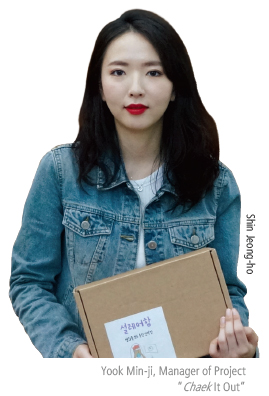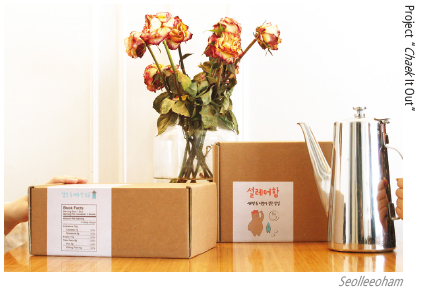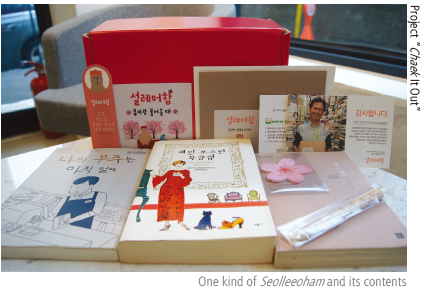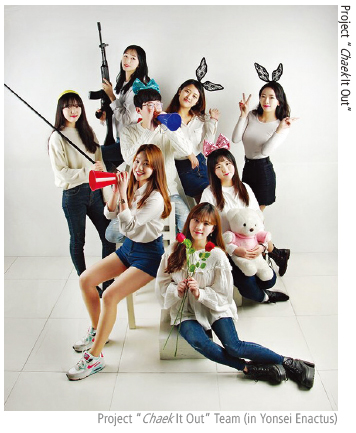
However, used bookstores in this street have revived and the street has started to regain its former prosperity again, thanks to the Project “Chaek It Out (Book It Out)” organized by Yonsei University Enactus, an international non-profit organization run by students. Despite their limited experience in business, the students have performed great roles in the renovation of used bookstores, and their way of selling and delivering books has caused a sensation among consumers. To know more about the students’ endeavor to start this business project and society-university cooperation, The UOS Times met with the Project Manager of Project “Chaek It Out,” Yook Min-ji.

Abouth the Project “Chaek It Out” and Its Purpose
When Yook and her team first looked for local business partners to work with, they saw the possibilities in the used bookstore street, based on the old history and the street’s glorious past. So, they started the project in 2015 with the purpose of reviving the used bookstores of Seoul. “We kept looking for a way to bring people back to this street, and finding a way to make them revisit the bookstores was our prime interest,” Yook said. One business model they came up with was “Seolleeoham (Box of Anticipation in Korean),” a small box filled with three random used books chosen by shopkeepers.
Of course, customers can choose the box among six categories, yet the contents are unknown to them until they open the box after receiving it from a delivery service. “Young people feel fun and curiosity because of anticipation about the contents, and then they feel the used bookstore street more familiar. More importantly, their interest can motivate shopkeepers, too,” Yook argued. Her team also planned a biennial used book fair alongside Cheonggyecheon.

Difficulties in the Beginning and Opportunities
Regarding hardships faced during the business project, as an undergraduate student herself, Yook pointed out that the most difficult problem was doing business and studying at the same time. “What we did and do requires the same amount of time and strength as an actual business. Moreover, the more industrious we become, the bigger results we get, so we have no choice but to work harder,” said Yook.
She also mentioned difficulties with her business partners in the early phases of the project, and talked about how the team changed those problems into opportunities. “At first, shopkeepers seemed to avoid any support from such new faces like ours. However, once we developed good relationships with them, they started to support and cooperate with us wholeheartedly,” she said.
Future Vision of “Chaek It Out”
“For now, goal of our project is to broaden cooperation with more and more used bookstores. Until now, because Seolleeoham has provided only limited genres of books, we have not been able to work with bookstores that deal in special categories, such as design or religion. So, we want to make partnerships with used bookstores of other genres in this street, and with other vintage used bookstores in other districts of Seoul. Our goal is to develop used bookstores socially and economically throughout the entire city,” Yook said eagerly.

What We Can Learn From the Project “Chaek It out”
She thinks that business projects like “Chaek It Out” give us a chance to think about opportunities which can affect not just recipients but also the entire society. “As members of society, we students can suggest possibilities for social development by considerable discussion and offering of solutions,” Yook argued. Moreover, when thinking about her organization Enactus’s other business project, she believes many other problems of society, even big ones, can be solved with students’ participation. “Many successful social enterprises like Marimond, the brand that helped former sexual slaves of the Japanese military (known as ?Comfort Women’), were started from student business project like ours,” she added.
Advice for Aspiring Startups
“Students lack professionalism and are short on experience, compared to people who have already started their own careers outside of the campus said Yook. “However, if we can assess the problems and assets, and propose various solutions, we are qualified and ready to face the challenge.”
“Students can start over more easily than people who already work in society, even if they face certain failure. So, if someone wants to be a startupper someday, I recommend that person to take advantage of this privileges as a student, and to try forming some business projects like ours for a test drive,” she proposed.
Some students dream of starting their own business someday, but give up soon especially because of lack of capital and experience. However, Yook’s case and her business project could be another way of starting a business, because it is far safer and could help the public more. This kind of business project is based on already-existing businesses, and when it succeeds, the benefits go not only to the students who are involved in the project, but to the society itself. Sometimes, the best answers can be hidden in plain sight, and small steps can lead to remarkable success.
Shin Jeong-ho
jhshin2110@uos.ac.kr

